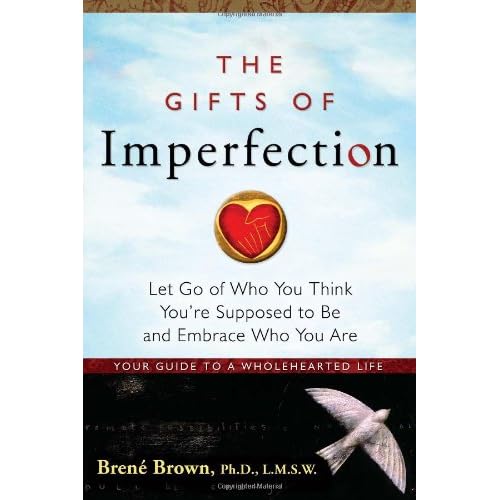If I learned anything in college, I learned not to take
information hook-line-and-sinker style.
I feel that the process of using discernment in my search for knowledge
is a skill that my time in higher education fine-tuned. Although I’m sure this
skill will continue to develop as I pursue knowledge throughout my life, I hope
my studies thus far have helped me to grow in discernment and wisdom in the
learning process.
With that said, I want to introduce to you a book that I’ve
been reading. It is called “The Gifts of
Imperfection” written by Brené
Brown, a writer and research professor at the University Of Houston Graduate
College Of Social Work. (Click here
to read her blog!) Though I am only about halfway through the book, I feel that
Brown has already imparted many practical and actionable tips for living
wholeheartedly. It’s funny because as a
Christian, I see how many of these tips are in-line with Christ-like living – but
from what I can tell, the author does not hold the same faith as I do. (Although, overall, I still recommend the
book.)
 |
| Click here to find this on Amazon.com |
If you remember, last month I wrote a series on recognizing intrinsic value. Though I only made it through 18 of the 31 days of writing, I
still haven’t forgotten the topic: it is still one that is close to my heart
and finds its way into my thoughts on a regular basis. In addition, I wrote
yesterday about friendship, the connection I feel to a few close friends and
the sense of security, and belonging that those relationships bring to my life.
With those two topics in my most recent writing history, I was happy to find
such wisdom in Brown’s way of approaching these topics.
Brown (who has researched this for at least a decade)
writes a lot about shame and the intense vulnerability a “shame-storm” causes. At first, I thought a shame storm included only that highly emotional state one experiences after a traumatic event. (Think, bombed presentation, an unnecessary fight, embarrassing moment, or basically anything else that causes feelings of mortification to arise.) But after reading further I discovered Brown's full definition of shame: "...the intensely painful feeling or experience of believing that we are flawed and therefore unworthy of love and belonging." She advocates talking to the right person when
experiencing a shame-storm. Choosing the
right person is the key. “We definitely want to avoid the following:
1. The friend who hears the story and actually feels
shame for you. She gasps and confirms
how horrified you should be. Then there
is awkward silence. Then you have to
make her feel better.
2. The friend who responds with sympathy (I feel so sorry
for you) rather than empathy (I get it, I feel with you, and I've been
there). If you want to see a shame
cyclone turn deadly, throw one of these at it: ‘Oh, you poor thing.’ Or, the
incredibly passive-aggressive southern version of sympathy: ‘Bless your heart.’
3. The friend who needs you to be the pillar of
worthiness and authenticity. She can’t help because she’s too disappointed in
your imperfections. You've let her down.
4. The friend who is so uncomfortable with vulnerability
that she scolds you: ‘How did you let this happen? What were you thinking?’ Or
she looks for someone to blame: ‘Who was that guy? We’ll kick his ass.’
5. The friend who is all about making it better and, out
of her own discomfort, refuses to acknowledge that you can actually be crazy
and make terrible choices: ‘You’re exaggerating. It wasn't that bad. You rock.
You’re perfect. Everyone loves you.’
6. The friend who confuses ‘connection’ with the
opportunity to one-up you: ‘That’s nothing. Listen to what happened to me one
time!’”
After giving these six funny, but true examples of a
friend who is not helping ease the shame-storm, Brown continues with this:
“Of
course, we’re all capable of being ‘these friends’ – especially if someone
tells us a story that gets right up in our own shame grill. We’re human, imperfect, and vulnerable. It’s
hard to practice compassion when we’re struggling with our own authenticity or
when our own worthiness is off balance.” (These quotes were taken from pages 10-11, and
were not altered by me in anyway—unless there is a typo I don’t see.)
I have been pleasantly surprised that a book that offers
advice for recognizing my own value can also provide actionable hints for
becoming a truly compassionate and empathetic friend. I want to be fully known,
and truly loved, but I also want those around me to have the same sense of
security and belonging in my friendship.
So, I’d love to hear, have you read any enlightening
books recently? Would you be interested in reading this one?




0 comments:
Post a Comment
I love to hear your thoughts!